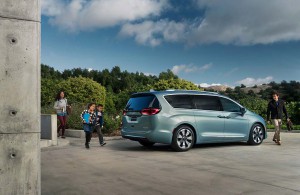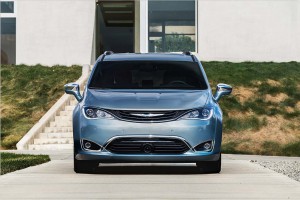
Might the Chrysler Pacifica Hybrid be getting a new purely battery-electric sibling? Rumor is the EV concept will debut at the Consumer Electronics Show.
For the moment, Fiat Chrysler Automobiles isn’t saying much about the concept vehicle it plans to unveil next month, but various sources suggest the Euro-American automaker will introduce a full battery-electric version of its new Pacifica minivan.
And, in an unusual step, the concept vehicle will make its debut at the Consumer Electronics Show in Las Vegas, rather than at the North American International Auto Show in Detroit. The all-electric Chrysler Pacifica could wind up being used as part of an autonomous vehicle project pairing FCA and Silicon Valley giant Google.
Late to the battery-car party, FCA appears to be racing to catch up with key rivals, as well as upstarts like Tesla Motors and Chinese-funded Faraday Future. A report by the Bloomberg news service suggests Fiat Chrysler is also working on a pure battery-electric version of one of its Maserati sports cars.
Until recently, Fiat Chrysler had been reluctant to play in the battery-car market. It introduced an all-electric version of its little Fiat 500 two years ago, but CEO Sergio Marchionne openly disdained the little car, lamenting that his company lost thousands of dollars on every one it sold.
But battery prices have been falling, even as range has been rising – General Motors is expected to deliver the first Chevrolet Bolt EV to a retail customer in the coming days. The plug model is rated at 238 miles per charge, according to the EPA, even though it costs just under $30,000 after factoring in a $7,500 federal tax credit. Tesla plans to launch a similar offering, the Model 3, during the second half of 2017.
Such products are expected to enhance consumer interest in battery-cars, but the industry is also being forced to act in order to meet the strict 2025 Corporate Average Fuel Economy, or CAFE, standards the Obama Administration is expected to formally lock in place before it leaves office next month. Most industry analysts believe that automakers will have to use some form of electrification on most of their products to meet the 54.5 mpg target.
(Mercedes teases 2018 E-Class Coupe. Click Here for the story.)
Almost every automaker has now committed to adding plug-in hybrids and pure battery-electric models. BMW has a special sub-brand for plug-based models, BMW i and Daimler AG announced at the recent Paris Motor Show plans for a similar brand it will call Mercedes-EQ, Volkswagen, meanwhile, plans to have at least 30 plug-based models in production by 2025.
Even exotic makers are getting into the act. Bentley is readying a plug-in hybrid version of its Bentayga SUV, and Aston Martin is developing its own pure battery-electric sports car – as is Porsche.
“In 2008, there were 12 electrified vehicles offered in the U.S. market and it represented 2.3% of the industry,” Ford CEO Mark Fields told Bloomberg last week. “Fast forward to 2016, there’s 55 models, and year to date it’s 2.8%.”
(Click Here for details about the strong sales start enjoyed by the Chrysler Pacifica.)
Within a decade, meanwhile, IHS Automotive has forecast that pure battery-electric vehicles, or BEVs, will account for as much as 3 million sales annually worldwide. Officials with Borg Warner, a major global automotive supplier, last month told TheDetroitBureau.com the figure could actually run twice as high.
FCA has been slow to embrace the shift. But CEO Marchionne has been showing signs of shifting his position. in June he said he didn’t see electrification as the “solution for all of man’s ills.” But he has since shown more interest in trying various forms of battery propulsion, especially as key competitors like General Motors, Toyota, Volkswagen and Ford move in that direction.
If and when the pure electric Pacific will be put into production is unclear – a detail that could be revealed at the annual CES event early next month.
(Click Here for TDB’s first drive in the new Chrysler Pacifica.)
One possibility is that FCA will produce a limited number of the vehicles to use in a new joint venture with Google’s autonomous vehicle division. The two have promised to run a test of Google’s self-driving software on 100 of the new Pacificas. It was originally expected FCA would use the new plug-in hybrid version of the minivan, but it could opt to use the project to test a fully electric version.

